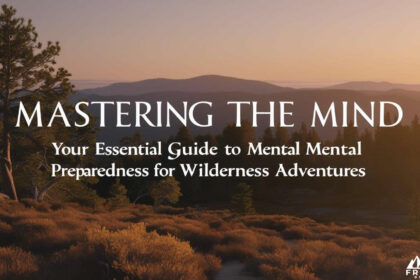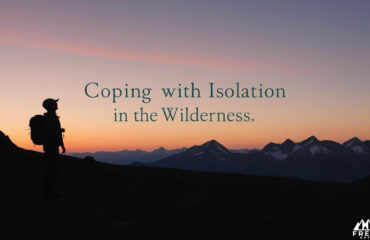
Learn how to create a mental preparedness plan for wilderness trips to enhance your hiking experience and boost resilience against challenges.
Importance of Mental Preparedness in Wilderness Trips
Mental preparedness is an essential aspect of planning for wilderness trips, accounting for nearly 80% of the challenges faced during long-distance treks. This statistic underscores the significance of a strong mindset, as mental endurance often proves more vital than physical capability. Studies have shown that a staggering 75-85% of aspiring thru-hikers on major trails abandon their journeys, which further highlights the need for mental resilience and preparation. By addressing mental challenges such as isolation and fear of the unknown, hikers can significantly improve their chances of success and enjoyment on the trail.
For example, when Sir Edmund Hillary prepared for his historic ascent of Mount Everest, he emphasized the importance of mental training alongside physical conditioning. Hillary understood that the psychological hurdles during such an arduous journey required as much attention as the physical demands, demonstrating how mental preparedness can be a game-changer in challenging environments.
Understanding Mental Resilience
Mental resilience is the ability to recover quickly from setbacks and maintain motivation during long journeys, which is crucial for hikers facing various adversities. Key components of mental resilience involve visualizing potential challenges and preparing for discomfort, which can enhance psychological endurance on the trail. Incorporating self-compassion and positive affirmations helps combat negative thoughts that may arise during strenuous outdoor experiences.
Cultivating a growth mindset, where challenges are framed as opportunities for learning and improvement, is essential in building resilience. For instance, during a hike, a sudden change in weather might cause anxiety; however, a resilient hiker can view this as a chance to adapt and test their problem-solving skills, thus reinforcing their mental fortitude.
Developing a Comprehensive Mental Preparedness Plan
Creating a mental preparedness plan is vital for addressing psychological barriers that hikers may encounter, such as feelings of isolation and physical discomfort. This plan should outline strategies for overcoming these challenges, including establishing a routine for daily tasks that reduces cognitive load while hiking. By doing so, hikers can conserve their mental energy for navigation and decision-making.
Including specific scenarios in your plan—such as dealing with bad weather or injury—can further enhance readiness and confidence. Additionally, scheduling check-ins with trekking partners to discuss mental states can provide invaluable support throughout the hike, fostering a sense of teamwork and shared experience.
Practical Techniques for Mental Training
Engaging in neuroplasticity exercises is one effective technique to improve mental agility, which is crucial for adapting to unexpected challenges on the trail. Simulating hiking conditions at home can help build confidence and prepare hikers for the physical and mental demands they will face outdoors. For instance, setting up a small obstacle course or undertaking a stair-climbing workout can mimic the intensity of a real hike, preparing both the body and mind for the journey ahead.
Visualization techniques, such as mentally rehearsing overcoming obstacles, can also help boost confidence and preparedness. Keeping a journal of past hiking experiences allows hikers to reflect on the challenges they faced and the strategies they used to overcome them, creating a mental toolkit for future adventures.
Coping Strategies During Wilderness Adventures
Implementing coping strategies while on a wilderness adventure is crucial for managing stress and maintaining focus during challenging moments. Techniques such as deep breathing can help center the mind and alleviate anxiety. Breaking hikes into smaller, manageable goals prevents feelings of being overwhelmed and maintains a sense of achievement throughout the trek.
Developing a personal mantra or phrase to repeat during tough moments can bolster mental strength and focus. For example, a hiker might adopt the mantra “one step at a time” to remind themselves of their progress and keep pushing forward. Additionally, taking moments to appreciate the natural surroundings provides mental rejuvenation and a sense of peace during strenuous hikes.
Enhancing Morale and Motivation
To enhance morale and motivation during long hikes, bringing comfort items, such as favorite snacks or personal gear, can provide psychological boosts. Building camaraderie with fellow hikers fosters support and encouragement, which significantly enhances mental strength. Setting clear personal goals, whether related to distance, elevation, or self-discovery, can help maintain motivation and focus throughout the journey.
Creating a checklist of achievements or milestones to celebrate during the hike reinforces a sense of accomplishment. For instance, reaching a scenic viewpoint can serve as a rewarding break point, allowing hikers to reflect on their progress and recharge mentally before continuing.
The Benefits of a Mental Preparedness Plan for Wilderness Trips
A well-developed mental preparedness plan not only improves the likelihood of successfully completing wilderness trips but also enriches the overall outdoor experience. Reflecting on past hiking experiences strengthens mental resilience, enabling better preparation for future adventures and fostering a sense of self-reliance and confidence.
Enhanced mental preparedness allows hikers to immerse themselves fully in nature, leading to greater enjoyment of the journey. Incorporating lessons learned from previous hikes can equip individuals to face both trail challenges and life obstacles with a fortified mindset.




